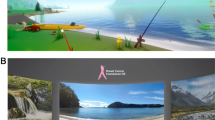Abstract
Millions of people are diagnosed with cancer each year in the USA and are living on systemic therapies designed to prolong their life. While these therapies are intended to treat the disease, most exacerbate cancer symptoms such as pain and anxiety. Oncologists and other healthcare providers are now challenged to deliver adjunctive therapies designed to improve quality of life of patients while they undergo cancer treatment, including minimizing already disruptive symptoms such as cancer pain and anxiety. Complementary and alternative medicines such as immersive virtual reality (VR) and neurofeedback (NF) are novel approaches to the management of cancer symptoms. While the evidence for combining VR and NF, specifically for management of cancer pain, while patients undergo systemic therapies, is still emerging; our preliminary findings suggest this treatment modality might offer relief of cancer symptoms. This paper briefly highlights the clinical need for supportive therapies such as VR and NF in the oncological setting and summarizes innovative research in this area.
Similar content being viewed by others
References
Siegel RL, Miller KD, Fuchs HE, Jemal A (2022) Cancer statistics. CA Cancer J Clin 72:7–33. https://doi.org/10.3322/caac.21708
Danon N, Al-Gobari M, Burnand B, Rodondi PY (2022) Are mind–body therapies effective for relieving cancer-related pain in adults? A systematic review and meta-analysis. Psycho-Oncology 31:345–371. https://doi.org/10.1002/pon.5821
Ahmad M, Bani Mohammad E, Anshasi HA (2020) Virtual reality technology for pain and anxiety management among patients with cancer: a systematic review. Pain Manag Nurs 21:601–607. https://doi.org/10.1016/j.pmn.2020.04.002
Alawneh A, Anshasi H, Khirfan G, Yaseen H, Quran A (2017) Symptom prevalence of patients with cancer in a tertiary cancer center in Jordan. Gulf J Oncolog 1:37–43
van den Beuken-van Everdingen MH, de Rijke JM, Kessels AG, Schouten HC, van Kleef M, Patijn J (2007) Prevalence of pain in patients with cancer: a systematic review of the past 40 years. Ann Oncol 18:1437–1449. https://doi.org/10.1093/annonc/mdm056
Nikbakhsh N, Moudi S, Abbasian S, Khafri S (2014) Prevalence of depression and anxiety among cancer patients. Caspian J Intern Med 5:167–170
Li X-M, Xiao W-H, Yang P, Zhao H-X (2017) Psychological distress and cancer pain: results from a controlled cross-sectional survey in China. Sci Rep 7:39397. https://doi.org/10.1038/srep39397
Greenlee H, Balneaves LG, Carlson LE, Cohen M, Deng G, Hershman D et al (2014) Clinical practice guidelines on the use of integrative therapies as supportive care in patients treated for breast cancer. J Natl Cancer Inst Monogr 2014:346–358. https://doi.org/10.1093/jncimonographs/lgu041
Balneaves LG, Watling CZ, Hayward EN, Ross B, Taylor-Brown J, Porcino A et al (2022) Addressing complementary and alternative medicine use among individuals with cancer: an integrative review and clinical practice guideline. J Natl Cancer Inst 114:25–37. https://doi.org/10.1093/jnci/djab048
Wiederhold BK, Gao K, Sulea C, Wiederhold MD (2014) Virtual reality as a distraction technique in chronic pain patients. Cyberpsychol Behav Soc Netw 17:346–352. https://doi.org/10.1089/cyber.2014.0207
Orakpo N, Vieux U, Castro-Nuñez C (2021) Case report: virtual reality neurofeedback therapy as a novel modality for sustained analgesia in centralized pain syndromes. Front Psychiatry 12:660105. https://doi.org/10.3389/fpsyt.2021.660105
Kubik A, Biedroń A (2013) Neurofeedback therapy in patients with acute and chronic pain syndromes: literature review and own experience. Przegl Lek 70:440–442
Pourmand A, Davis S, Marchak A, Whiteside T, Sikka N (2018) Virtual reality as a clinical tool for pain management. Curr Pain Headache Rep 22:53. https://doi.org/10.1007/s11916-018-0708-2
Rolbiecki AJ, Craig K, Polniak M, Smith J, Ghosh P, Mehr DR (2022) Virtual reality and neurofeedback for management of cancer symptoms: a feasibility pilot. Am J Hosp Palliat Care https://doi.org/10.1177/10499091221109900
Viviani G, Vallesi A (2021) EEG-neurofeedback and executive function enhancement in healthy adults: a systematic review. Psychophysiology 58:e13874. https://doi.org/10.1111/psyp.13874
Trambaiolli LR, Kohl SH, Linden DEJ, Mehler DMA (2021) Neurofeedback training in major depressive disorder: a systematic review of clinical efficacy, study quality and reporting practices. Neurosci Biobehav Rev 125:33–56. https://doi.org/10.1016/j.neubiorev.2021.02.015
Roy R, de la Vega R, Jensen MP, Miró J (2020) Neurofeedback for pain management: a systematic review. Front Neurosci 14:671. https://doi.org/10.3389/fnins.2020.00671
Pindi P, Houenou J, Piguet C, Favre P (2022) Real-time fMRI neurofeedback as a new treatment for psychiatric disorders: a meta-analysis. Prog Neuropsychopharmacol Biol Psychiatry 119:110605. https://doi.org/10.1016/j.pnpbp.2022.110605
Baños RM, Espinoza M, García-Palacios A, Cervera JM, Esquerdo G, Barrajón E et al (2013) A positive psychological intervention using virtual reality for patients with advanced cancer in a hospital setting: a pilot study to assess feasibility. Support Care Cancer 21:263–270. https://doi.org/10.1007/s00520-012-1520-x
Funding
This work was funded by the University of Missouri, Department of Family and Community Medicine.
Author information
Authors and Affiliations
Contributions
AJR wrote the first draft of manuscript with AG and BF providing thorough edits and subject matter expertise. All authors participated in providing final edits.
Corresponding author
Ethics declarations
Ethical approval
Ethical approval for the original study referenced in this paper was provided by the University of Missouri, Institutional Review Board. The Review Board approved the initial study as an exempt study, with a written consent in which patients digitally acknowledged using REDCap.
Competing interests
The authors declare no competing interests.
Additional information
Publisher’s note
Springer Nature remains neutral with regard to jurisdictional claims in published maps and institutional affiliations.
Rights and permissions
Springer Nature or its licensor (e.g. a society or other partner) holds exclusive rights to this article under a publishing agreement with the author(s) or other rightsholder(s); author self-archiving of the accepted manuscript version of this article is solely governed by the terms of such publishing agreement and applicable law.
About this article
Cite this article
Rolbiecki, A.J., Govindarajan, A. & Froeliger, B. Immersive virtual reality and neurofeedback for the management of cancer symptoms during treatment. Support Care Cancer 31, 493 (2023). https://doi.org/10.1007/s00520-023-07957-3
Received:
Accepted:
Published:
DOI: https://doi.org/10.1007/s00520-023-07957-3




